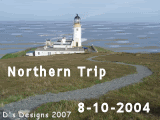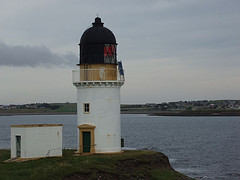Western Isles NHS Reform
Presentation by Western Isles NHS Board
Location: Caberfeidh Hotel, Stornoway
Date: 1 December 2005, 18:00 hours
Chair: Mr Dick Manson, Chief Executive WIHB
Attendance: 150
Notes taken by myself in a private capacity
Presentation is fronted by:
Dick Manson, Chief Executive
Dr John Smith, medical director
Prof Andrew Sim, professor of Rural and Remote Medicine UHI
Cathy Carnell, general manager hospital services
Michael Cook
director of nursing
(apologies: could not take down everybody's details)
Dick Manson started by giving
a 30 minutes' presentation (promised as 15 mins), outlining first of
all the challenges facing the NHS in the Western Isles
- ageing population
- an increase in chronic disease
- an increase in emergency admissions, a quarter of which are aged 65 or over
- EU working time directive
- shortage of clinical staff (generally in Scotland)
- advances in medical science, difficult to keep up with
- expectations from the public
The NHS is there to meet health needs.
The Western Isles has a unique demographic profile.
Total population: 26,500
The life expectancy for men is the 3rd worst in Scotland, 72 years of age.
The life expectancy for women is the 3rd best in Scotland, 80 years of age.
Avoidable illness is too prevalent
Population in the Western
Isles consists of a high percentage of elderly people, higher than
anywhere else. 1 out of 5 people is aged 65 or over
The number of young people is decreasing, although their rate of academic achievement is better than elsewhere in Scotland
Birth rates are falling; expecting to go down from 220 last year to 150 in 2010
Crimerate is lower than average
Incomes are 14% lower than average for Scotland
House prices are lower
Unemployment rates are higher
The rates of alcohol-related admissions is much higher
There are higher numbers of people suffering from heart conditions and depression
The NHS is very well used.
Every day, the hospitals have 150 inpatients
20 attend A&E
18 patients are admitted or discharged
320 people see their GP
1380 prescriptions a day are dispensed
Doctors:
16 consultants
11 doctors-in-training
35 general practitioners
3 GP registrars [in training]
This represents an unrivalled clinical resource
There are 229 hospital beds (spread out over the 3 sites Stornoway, Benbecula and Barra), 30% of which are unused
Service redesign
This has been imposed by government, and should be from bottom up
More than 100 people have been involved, NHS staff as well as patients
It should provide a sustainable model for the next 10 years
There were a number of redesign groups
1 Primary Care Out-of-hours
There will be a move from GP's on-call to emergency care teams. These consist of nurses, paramedics and a GP
2 Surgery
Four surgeons are to provide
core-services for all types of surgery, including orthopaedics, general
surgery, obstetrics and gynaecology
3 General medicine
Will be moving to a
multidisciplinary approach (doctors, nurses, allied health professions
[physiotherapists, pharmacy &c]. There will be 4 consultant
physicians, which should be enough to provide a 24/7 service
4 Maternity (Cathy Gillies)
This service is to be
retained locally. It is to be midwife-led, with support by a consultant
obstetrician and a surgeon. There will be a rota for a safe service.
Training of midwives has already started, with telemedicine (for
backup) and a consultant paediatrician
5 Paediatrics (Chris Langley)
Paediatric care to be
provided by GPs, consultant physicians and a consultant paediatrics for
support. Training to start next week
6 Public health (Lucy MacLeod)
Is to tighten its links with the local authority and other agency. Training has commenced for national accreditation
7 Psychiatry (Dr Caulcott)
Service to be retained here. The skills of existing professional is to be enhanced.
Care will be CPN [community psychiatric nurse] led; with GPs in the Uists
8 Medical trainees (Dr Dickie)
Western Isles Hospital will continue to be a training centre, and the aim is to maintain skills in this hospital’s environment.
9 Renal services (Phil Tilley)
A renal dialysis centre is to be established at WIH; a lead-nurse has been appointed
10 Radiology (Malcolm McNinch)
A radiologist is available 3 days out of every 7
The service will be
radiographer (sic) led, i.e. by the people that take the images. They
will be sent by telemedicine (electronically) to a consultant
radiologist at a mainland centre. Training has commenced
Core services
General medicine
Surgery & orthopaedics
Anaesthetics
Maternity & paediatrics
There will be 8 permanent
consultants, and 9 on long-term locum contracts. The aim is to minimise
locums, because they are unfamiliar with local working practices.
Long term locums are paid a
normal rate; short-term locums are paid an hourly rate, determined by
an agency which can charge up to £70 an hour. If someone is working or
on-call 24/7, then this works out as £11,800 per week, as reported in
the media.
Visiting consultants in other specialities (ophthalmology, rheumatology &c) will offer support.
Key Themes
Break down barriers between primary and secondary care
Establish a multi-disciplinary approach
Develop [new] roles for nurses, allied health professionals (AHP) and doctors
Education and training
Remote and rural healthcare:
models were developed for the big cities, not for an area like the
Western Isles or generally the north of Scotland
Implementation groups will
consist of clinical staff, nurses, AHP, support staff and members of
the public. A timetable was giving for the implementation
Redesign groups: for Uist & Barra hospital (led by Mr Manson) to optimise utilisation of resources at the Benbecula hospital
The aim is to establish a
safe, sustainable service, backed by (mainland) centres of expertise,
leading the way in remote / rural healthcare. The care will be as local
as possible, and as specialised as necessary.
This was the end of Mr
Manson's presentation. The remainder of the meeting, between 6.40 and
8.00 pm, was taken up with a question and answer session. Some of the
answers to questions have been worked into the words of Mr Manson, for
the sake of clarity.
Cllr for Bayble (Point) asked
questions about the redesign of the structure of the Health Board and
the provision of psychiatric care, now that the two psychiatrists are
retiring
Mr Cook replied that there
would be wider training for staff. A meeting with CPNs and medical
staff for short term solutions would be sought. Dr Caulcott is going on
holidays for 6 months from December 5th, for which a locum would be
required. An advertisement for a permanent position would be placed.
Mr Manson replied that the
Health Board review would be carried out in the longer term, but
current focus would be on frontline services, in cooperation with CnES.
The Cllr remarked that
provisions should have been made for the vacancy, which should have
been advertised a long time ago. The review appears to be a top-down
exercise.
Mr Manson replied that the
overheads for WIHB are the lowest in the 6 Health Boards in the north
of Scotland (Orkney, Shetland, Highland, Grampian, Tayside and W.
Isles).
One other councillor asked about travel expenses
Mr Manson replied that the vast majority of these are on actual health board business, to enhance services.
A service user for
psychiatric care expressed concern about the continuity of care in
community, and in-patient beds. The waiting time for specialist care
was too long. Locums don't cut it, you need regular staff. Oh, Mr
Manson, your bodylanguage is wrong. You're condescending (!)
Mr Manson apologised for the last impression.
Dr Michie noted that a number
of beds might be retained for emergencies, but this depended on the
outcome of the service review.
The user remarked that if care is dispersed to GPs, expertise might be lost
Dr Michie conceded that resources are problematic
One member of the audience read out a statement to Mr Manson, on behalf of a large majority of the nurses.
The nurses are fed up,
demoralised and intimidated. A rule of Stalinism is alleged, a reign of
fear. Complaints are not made because of fear. Proposed ward closures
bring shame on the health board. It is a corrupt regime, devoid of any
decency. If grievances are uttered, disciplinary action is taken
against the relevant members of staff. Changes are always top down. The
working groups consist of management level staff, who impose their own
ideas after slapping down workers’ ideas.
Dr John Smith replied to this.
Changes are being implemented
from the roots upwards, in order that it’s the workers’ project. There
is a movement of care to the primary sector. WIHB is engaging with
staff to implement changes.
Professor Sim expanded on some of the themes, touched upon by Mr Manson.
Care is to be offered
primarily by trained staff, and skills are to be taken over by other
health professionals, which is UK policy. The junior doctor, apart from
looking after patients on a day-to-day basis, will focus on their
training.
There is a change in surgical
practice. The hospital stay after an operation is much shorter. After
(e.g.) a gall-bladder operation, a patient can normally expect to go
home after 2 days, was 2 weeks. Because of this, the surgical wards
will change into one 7-day ward (including paediatrics) and one 5-day
(a week) ward.
Medicine will focus on care
at home rather than in the hospital because many of the beds on the
medical wards lie unused. These unused beds are to be closed.
Obstetrics and orthopaedics: general surgeons will be trained to do work in these fields.
The aim is to provide a safe
service, performed by professionals who are properly trained for
everything they’re required to do. Transfers to mainland
hospitals are to be reduced to the absolute minimum.
A renal and a stroke unit are
to be established, using the beds no longer in use on the medical
wards. The lead nurse for renal care has been appointed, but will not
be in post until February 2006.
There will be no redundancies, but temporary contracts will NOT be extended.
Focus will be on staff
retraining and to enrich nursing skill mix. Nurses will be redeployed,
to community care. Staff have had a similar presentation in the weeks
leading up to today.
Uist & Barra Hospital
(Balivanich, Benbecula) is only 4 years old, and has state-of-the-art
equipment. Unfortunately, it does not have the facilities to provide
the necessary aftercare.
Angus MacNeil, Western Isles MP expressed his concerns about staff morale and wanted an explanation about soaring locum costs.
It was explained that only 4
locums in the last year had been paid the massive £11,800 a week rate.
When you’re on-call, you are not actually working – you’re available
for work.
Friday, 2 December 2005
Subscribe to:
Post Comments (Atom)












No comments:
Post a Comment